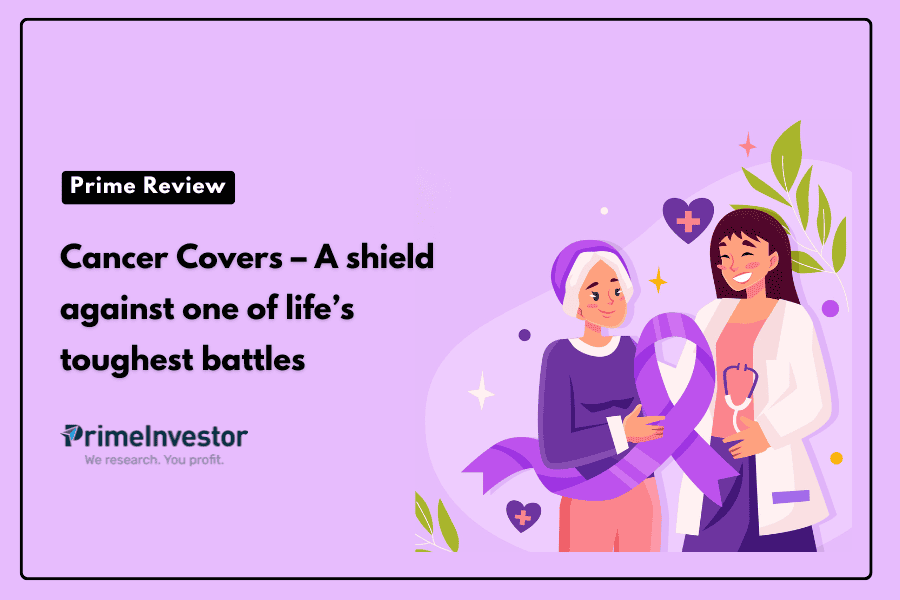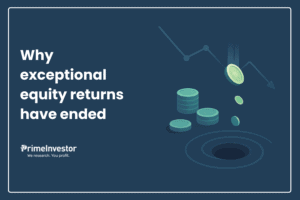Cancer statistics in India are sobering. What’s more, the disease is growing faster than we would like to think. But here’s what makes a cancer diagnosis even more devastating: it’s not just the emotional toll—it’s the financial tsunami that follows. Treatment costs spiral into lakhs within weeks, turning family finances upside down. Even with health insurance, many discover too late that their coverage has gaping holes when cancer strikes.

Why regular covers fall short
Regular health insurance and even critical illness covers have a few shortcomings that make them inadequate to address the toll a cancer diagnosis takes:
Your regular health plan is built for regular problems: Most health insurance works on indemnity (reimbursement). The compensation you receive is linked directly / indirectly to hospitalisation.
But cancer treatment often entails other kinds of treatment beyond surgery which requires hospitalisation – chemotherapy, radiation, immunotherapy and targeted drug therapies which do not entail hospitalisation. These treatments can be so expensive that they can deprive a family of its entire life savings.
Cancer also brings a storm of non-medical expenses that insurance companies won’t touch: lost income, travel costs for treatment, special diets, caregiving expenses, and countless other hidden costs.
Coverage caps: Your policy might look generous but often come with caps on the cost of treatments and procedures. This could mean more out-of-pocket spends.
Early detection becomes an impediment: Regular health covers aside, there are critical illness covers that address the financial strain from diagnoses such as cancer. However, many critical illness covers only kick in for “severe” cancer or cancer in late stages. This seems counter-intuitive since catching cancer early provides the best recovery outcomes.
How cancer-specific covers help
This is why specialised cancer covers from insurers are worth a look. These covers are specially tailored to cover cancer treatments, and address the shortcomings of regular health insurance plans. These covers pay out a lump sum on diagnosis, which help reduce the financial strain from cancer treatments, whether from treatment costs or loss of income. They come in various forms ranging from benefit only (lumpsum payouts on diagnosis) to indemnity to a combination of both. Cancer covers can help as follows:
- Coverage across stages: Cancer plans cover all stages including early-stage cancers. They usually let you cover all members of the family with some rules on how the sum insured is arrived at for working and non-earning members. This means the insured is not left high and dry after having been fortunate enough to diagnose the disease early.
- Lump sum payout: These covers typically include a lump sum payout (called the benefit component) which helps you cover non-hospitalisation expenses. As mentioned in the section above, there are several associated costs with cancer other than hospitalization. Usually, lumpsum payouts vary based on the stage of cancer. For instance, Aditya Birla Activ Secure – Cancer Secure offers 50% of the Sum Insured (SI) for early-stage cancer, 100% of SI payout for major stage and a 150% payout for advanced stage. The payout can be used not just for expenses directly linked to the medical treatment but also other expenses that could be involved. Usually, the cover terminates once the maximum payout under the policy has been reached – meaning, it cannot be renewed anymore.
- Indemnity component: Many cancer covers go a step further and address the issue of cover no longer being available once a payout is made. These benefit-plus-indemnity covers include an indemnity component in addition to the lump sum payout component. This part of the cover works similar to a regular health insurance plan where hospitalisation and other specified costs are reimbursed. These plans are usually renewable even after a cancer diagnosis and claim and are tailored to cancer treatments.
Of course, as with all policies, there is a waiting period and exclusions as follows:
Waiting period: Cancer covers come with a waiting period that is usually 3 to 4 months long. The Aditya Birla cancer cover also comes with a short 7-day survival period requirement (the time period the insured must live after diagnosis).
Exclusions: Like critical illness insurance plans, these too come with a standard set of exclusions such as claims arising out of HIV / AIDs / STDs, suicide and self-harm, influence of drugs / alcohol, breach of law, congenital diseases / abnormalities.
Who should get a special cancer cover?
You should consider getting a cancer cover if:
- You have a family history of cancer
- You have dependants that rely on you financially
- If your standard health insurance does not adequately cover cancer treatment and you do not have sufficient savings to cover cancer treatment costs.
Our shortlist
In India, some health insurers offer cancer specific policies. After analysing claims data and policy features, we have narrowed down on a shortlist of the cancer covers that can be considered and the scenarios that they might be suited for.
#1 Benefit only plan – Aditya Birla Activ Secure Cancer Secure Plan
This is a simple plan with only a benefit component. It makes specified payouts based on the stage of cancer at diagnosis and terminates once the maximum payout has been reached.
Key Features
- Covers early, major and advanced stages of cancer
- Entry age is 18 to 65 years
- Can cover self, spouse, up to four children and 2 parents and 2 parents in law
- Sum insured ranges from Rs 5 lakhs to Rs. 1 crore. However, the SI that can be taken is capped at 12 times gross annual income for the earning member; for the spouse, it is capped at 50% of proposer’s SI or Rs 30 lakh whichever is lower. For children, the cap is 50% of proposer’s SI or Rs 15 lakh, whichever is lower. In the case of non-earning parents / in laws, the cap is Rs 10 lakhs.
- The policy comes with an initial waiting period of 90 days and 180 days in case of early stage and a survival period of 7 days.
- The payout for an early-stage diagnosis is 50% of SI capped at Rs. 10 lakhs, 100% of SI for major stage and 150% of SI for advanced stage.
- Once a claim is made for major stage or advanced stage, the policy terminates and cannot be renewed anymore with payouts under the policy being capped at 150% of SI.
- Maximum number of claims: One under early-stage cancer and/or one under major or advanced stage.
Key documents: Policy brochure, Policy benefit illustration, Policy wording
Suitability
This is a plain vanilla benefit plan that makes a fixed payout based on the stage of the diagnosis. However, it comes with caps on the sum insured that one can secure based on the income of the proposer. This plan scores on simplicity – one can be assured of a lump sum payout if the need were to arise. It is best suited for someone with an already robust health insurance plan that meets the requirements of a cancer treatment, but seeking additional security to protect finances from being dented by a cancer diagnosis.
#2 Benefit + Indemnity cancer covers
Under products that offer both a lump sum payout as well as reimbursement of medical expenses, we have narrowed down on two options worth considering:
Option 1 – HDFC ERGO ICAN
This plan brings with it cashless treatment in network hospitals, claims for OPD and a lump sum payout. The plan can also be renewed lifelong even after a claim.
Key features
- This plan offers SI ranging from Rs. 5 lakhs to Rs. 50 lakhs
- While the minimum entry age for adults is 18, the policy is available only to those aged between 5 and 65 years.
- The waiting period in this cover is 120 days
- The SI can be enhanced at renewal but fresh waiting period will apply to the enhancement
- It covers pre-hospitalisation of up to 30 days and post hospitalisation of up to 60 days
- The plan covers emergency ambulance of up to Rs. 2,000 per hospitalisation
- Follow up care post treatment is covered up to Rs. 3,000 per year
- Since the plan has an indemnity component, it covers both conventional cancer treatments (chemotherapy, radiotherapy, organ transplantation as part of cancer treatment and onco-surgery) and also has an option to include advanced treatments (proton beam therapy, immunotherapy, personalised and targeted therapy, hormonal therapy or endocrine manipulation, stem cell transplantation). This indemnity cover is lifelong and can be renewed even after a claim.
- The plan comes in two variants: Essential and Enhance. Under the Énhance’ variant there is also a lump sum component in the following forms: CritiCare benefit (60% of SI as lumpsum over and above the base SI, if the insured is diagnosed with cancer of specified severity) and Family Care benefit (100% of SI as lumpsum over and above the base SI if the insured gets diagnosed with either advanced metastatic cancer Stage IV or recurrence of cancer whichever is earlier). Both these benefits are available only if insured is over 18 years and is also payable only once in the lifetime of the policy.
Key documents: Policy Brochure, Policy Wordings
Option 2 – New India Cancer Guard
This plan, like the HDFC ERGO ICAN offers indemnity (with cashless facility at network hospitals) plus a lump sum pay out.
Key Features
- This policy is available to anyone between 18 and 65 years and can include dependants including children older than 3
- SI under this product can range from Rs. 5 lakhs to Rs. 50 lakhs. This can be enhanced at the time of renewal but cannot be if the insured is over 60 years of age or if cancer has already been diagnosed.
- The SI eligibility is dependent on the age of the insured and starts to decline to Rs. 15 lakhs and lower if the age of the insured is 50 years or more.
- The plan comes with an initial waiting period of 90 days.
- This plan covers both conventional as well as advanced cancer treatments. It also covers 58 listed day care procedures, 30 days of pre-hospitalisation expenses and 60 days of post hospitalisation expenses.
- For hospitalisation claims, a minimum of 24 hrs hospitalisation is required. However, there are exceptions to this, details of which can be found in the policy document. The plan also covers claims for outpatient, inpatient and day-care towards the treatment of cancer.
- Other coverage includes ambulance expenses of Rs. 3,000 per hospitalisation and post treatment follow up of Rs. 10,000 per insurance period.
- The policy also comes with a lump sum payout – a benefit under the name Cancer Care Benefit amounting to 50% of the SI would be paid in addition to the admissible claim amount, if insured is diagnosed for the first time with Advanced Metastatic Cancer (Stage IV).
Key documents & links: About the policy, Premiums, Customer Information Sheet, Prospectus
Suitability of indemnity plus benefit plans
The combined indemnity plus benefit plans could be for you if you find that your existing health insurance does not sufficiently provide for cancer treatments. But do bear in mind that unlike Aditya Birla’s pure benefit plan, these plans make the lump sum payout only if cancer is discovered at a certain severity and definitely not at early diagnosis.
What to keep in mind
#1 Understand what’s actually covered: If you can get a doctor to take a close look at the conditions covered in the policy you have shortlisted, it would be invaluable especially if there is a family history of cancer.
#2 Calculate your real needs: For indemnity coverage, find out cancer treatment costs at hospitals you’d choose. Estimates place cancer treatment costs range from Rs. 80,000 all the way up to Rs. 40 lakhs or more depending on the hospital, geography, stage / type of cancer and more. This would help you to arrive at a more reliable estimate of the cover you need.
As far as benefit plans go, the larger the SI the better to ensure it covers not only medical costs but other related costs and even possibly loss of income. Here you can also apply many of the principles that are used in arriving at a sufficiently large critical illness cover that we wrote about in our earlier article.




5 thoughts on “Prime Review: Cancer Covers – A shield against one of life’s toughest battles”
I have HDFC ergo health insurance for myself and my spouse, individual plan. Will it be okay to have HDFC ergo ICAN or better to diversify it?
Hello,
Diversification across insurers is not a necessity. In fact, having multiple policies with the same insurer may make the claim process smoother, as there’s a single point of contact and shared claim history.
In the case of cancer care policies, it’s better to evaluate them based on their own features and how well they suit your needs. The fact that it’s from the same insurer need not be seen as a drawback in your decision-making.
Regards
Thank you for the clarification sir.
I am 62 now..Am I eligible for this?
Hello Sir,
The plans we have shortlisted have entry age ranging up to 65 years. You can contact the insurers for more details.
Thanks.